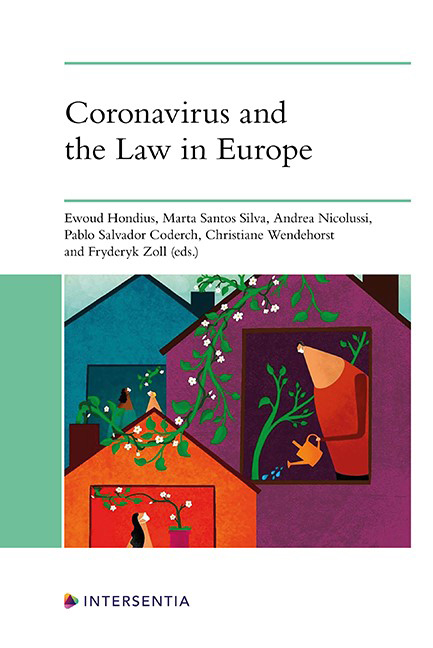Book contents
- Frontmatter
- Preface
- Contents
- List of Keywords
- List of Contributors
- PART I COVID-19 AND FUNDAMENTAL RIGHTS
- PART II STATES AGAINST THE PANDEMIC
- PART III COMPENSATION FOR COVID-19 RELATED DAMAGE
- PART IV CONTRACT LAW
- PART V CONSUMER LAW
- PART VI LABOUR AND SOCIAL LAW
- PART VII CORONAVIRUS CHANGING EUROPE
- Epilogue
- Annex: ELI Principles for the COVID-19 Crisis
- About the Editors
“Coronavirus Contract Law” in Scotland
Published online by Cambridge University Press: 10 December 2021
- Frontmatter
- Preface
- Contents
- List of Keywords
- List of Contributors
- PART I COVID-19 AND FUNDAMENTAL RIGHTS
- PART II STATES AGAINST THE PANDEMIC
- PART III COMPENSATION FOR COVID-19 RELATED DAMAGE
- PART IV CONTRACT LAW
- PART V CONSUMER LAW
- PART VI LABOUR AND SOCIAL LAW
- PART VII CORONAVIRUS CHANGING EUROPE
- Epilogue
- Annex: ELI Principles for the COVID-19 Crisis
- About the Editors
Summary
This contribution describes the Scottish legislative response to the coronavirus pandemic, noting that the chief impact on contracts is most likely to arise from issues of the supervening illegality of particular kinds of activity normally carried out under contracts. Scottish law largely follows English law in its doctrine of frustration and its approach to force majeure clauses. This contribution accordingly suggests that the temporary interruptions to performance which the coronavirus legislation brings about may not be sufficient to discharge affected contracts. The Scottish courts may need rather to develop their very limited powers of equitable adjustment in response to changed but not necessarily frustrating circumstances. Some ways in which this might be done are suggested.
SOME SCENE-SETTING
A little scene-setting is necessary at the start. As a legal jurisdiction Scotland, although part of the United Kingdom for more than three centuries, has remained what it was before that union, a legal system and law wholly distinct from that of England and Wales and, indeed, what is now Northern Ireland. While much law enacted by the United Kingdom Parliament has applied throughout the united territories (notably in taxation, welfare and commercial law), the situation is complicated by the variable systems of administrative and legislative devolution in Scotland, Wales and Northern Ireland. It is worth noting that there is no devolution of any kind to or within England; the United Kingdom is not a federation. The fundamental principle of Scottish devolution is that everything is devolved unless specifically reserved to the United Kingdom Government and Parliament. Amongst many other things, this means that Scottish private law and public health in Scotland are devolved matters, but not commercial law (which for present purposes includes consumer law). Thus, for example, the Corporate Insolvency and Governance Act 2020, which gives some important protection from creditors and other reliefs from the requirements of company law for companies in difficulty thanks to the pandemic, is a United Kingdom Act that applies to the whole country.
This background has been highlighted because it explains the sometimes-misunderstood role taken by the devolved Scottish Government in responding, first, to the threat, and then to the reality of the coronavirus pandemic in Scotland in the first half of 2020. Devolution means that the Scottish Government has the legal duty to deal with the Scottish outbreak, as do their Welsh and Northern Irish counterparts in their territories.
- Type
- Chapter
- Information
- Coronavirus and the Law in Europe , pp. 491 - 508Publisher: IntersentiaPrint publication year: 2021

